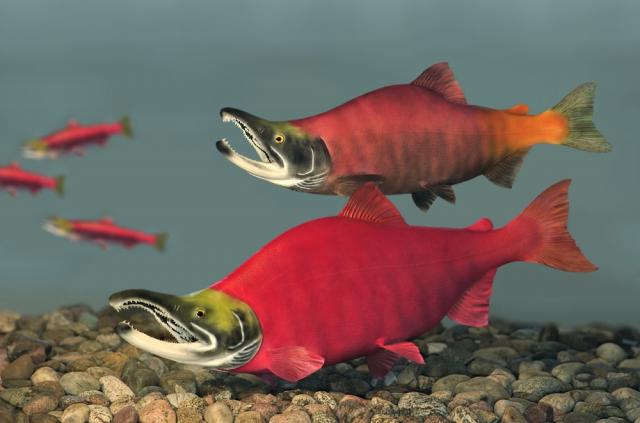This is a guest post by Nikki Skuce, and originally appeared in the Edmonton Journal.
In Edmonton this week, experts and lawyers have gathered again at the Joint Review Panel hearings on Enbridge’s Northern Gateway Pipeline and tanker project. They’ll challenge and defend percentages, growth, probabilities. They’ll speak about projections and expectations. They’ll talk about cost versus benefit.
Meanwhile, on the West Coast, a fragile ecosystem is very much alive. Its emerald green islands slope into the Pacific Ocean. Eagles soar over Douglas Channel, feeding off migrating salmon. The rare spirit bear forages on a beach for clams and cockles, unaware that its future is being debated in an Alberta hearing room.
Anyone paying attention to the panel’s hearings that resumed two weeks ago in Edmonton has probably noticed a lot of numbers being thrown around. The current hearings focus on the pipeline’s economics, which don’t always add up — price differentials, job numbers, refinery capacity, liabilities. But while Enbridge and other economic experts haggle over numbers, it seems obvious that some things can’t be assigned a dollar value. Some things are priceless.
The Great Bear Rainforest is an international treasure, home to magnificent cedar trees and the spirit (kermode) bear. Its waters are teeming with life — humpback, orca and fin whales all feed there.
In 2006, the B.C. government, federal government, First Nations, environmentalists and industry recognized the area’s pristine beauty and ecological values, and worked together to form a series of conservancies (more than two million hectares protected), ecosystem-based logging and conservation financing. Coastal First Nations have since invested millions of dollars into a sustainable economy.
British Columbians understand how precious it is and how stormy conditions would be for crude oil supertankers introduced by Enbridge. Polls consistently show that close to 80 per cent of the province supports an oil tanker ban for Canada’s North Pacific Coast, and Coastal First Nations have declared an oil tanker ban in their traditional waters.
Many of B.C.’s own thriving industries depend on clean water. Fisheries and tourism employ 45,000 people on the coast — and that doesn’t include inland jobs dependent on the healthy salmon watersheds Enbridge’s pipelines would cross. Salmon are the mainstay of the Northwest’s economy, not to mention rich aboriginal cultures. An oil spill would put these in jeopardy.
By comparison, Enbridge promises a mere 104 permanent operating positions with Northern Gateway and 113 positions with the associated marine services after construction. Enbridge CEO Patrick Daniel is also on record saying it would consider contracting PetroChina to build its pipeline.
This is the irony in opening remarks by Northern Gateway president John Carruthers at the hearings, comparing Enbridge’s proposed pipeline to the Canadian Pacific Railway. The railway’s dark history includes imported Chinese workers who suffered dangerous conditions, low pay and, for many, death. An increase in oilsands production from this pipeline would mean bringing in foreign workers to meet labour demands, displacing Canadian jobs that could have been sustained over the long term if the oilpatch were developed at a more sustainable rate.
However, Carruthers is right about the proposed pipeline building community. The threat of poisoning B.C.’s pristine rivers with bitumen destined for overseas markets has brought together non-traditional bedfellows — First Nations, fishermen, hunters, businesses, municipalities, environmentalists, churches and Conservative voters — in a fight for clean water and an oil-spill-free coast. Together, we’re saying “yes” to our coast and wild salmon economies, and “no” to oilsands pipelines, “no” to supertankers, and “no” to Enbridge.
Cost-benefit analysis, in the end, needs to assess more than the economics and financial aspects of Enbridge’s project for British Columbians. But how do we put a price on the eagles, salmon and bears that rely on our clean coastline? How do we put our fresh water at risk of permanent contamination? What insurance company can replace the cultures and economies reliant on salmon and seafood if the coast becomes tarnished with oil?
For most British Columbians, there is no overseas market for bitumen that would offset the loss of our Great Bear Rainforest and wild salmon rivers. There is no investment more lucrative than investing in clean water and sustainable economies for future generations. There is no insurance that can replace the great biodiversity and rich cultures that exist on our coast.
Some things are priceless. No matter how you crunch the numbers, they just aren’t worth putting at risk to oil spills.
Nikki Skuce is a senior energy campaigner with ForestEthics Advocacy, based in Smithers, B.C.
Image credit: Spawning male sockeye by Steven Russell Smith Photos | Shutterstock
Subscribe to our newsletter
Stay up to date with DeSmog news and alerts







